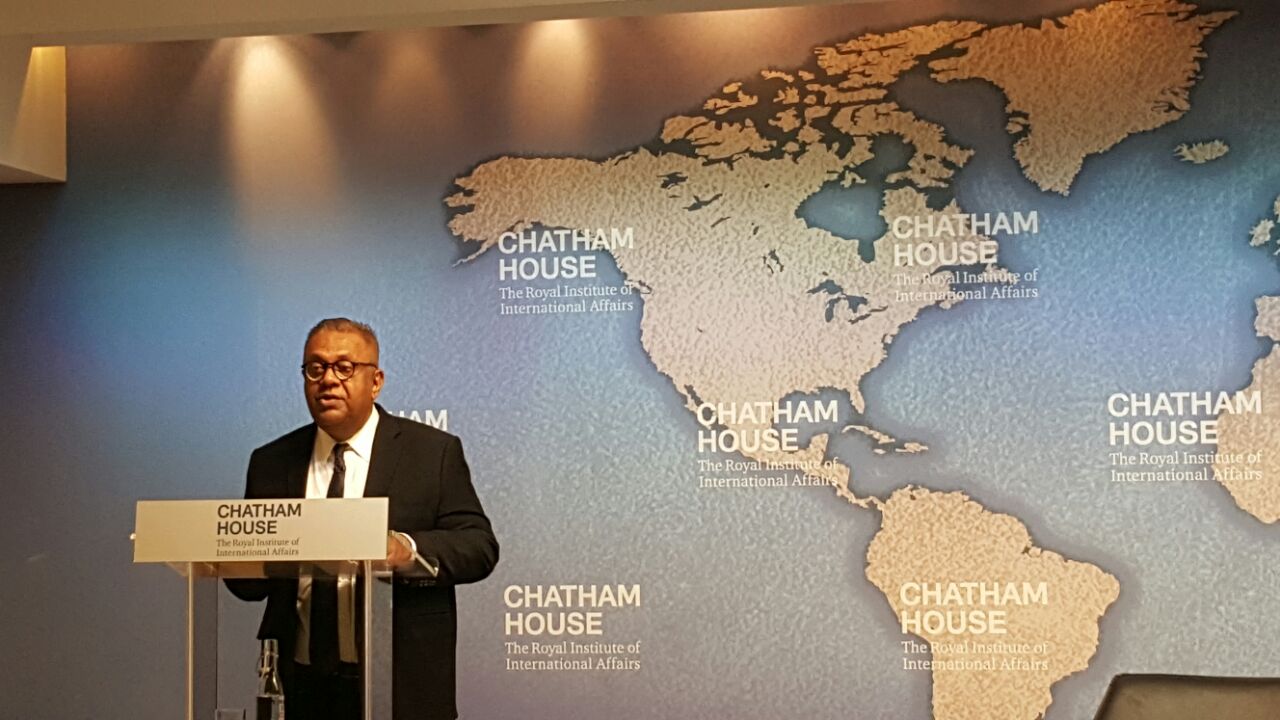Sri Lanka is committed to implementing the most recent Human Rights Council resolution according to the country’s Minister of Foreign Affairs, although there is only consensus for establishing a credible domestic mechanism.
The foreign minister, Managala Samaraweera, gave a talk about Sri Lanka’s reconciliation process at Chatham House in London on Wednesday night. The minister’s speech was followed by a question and answer session with the audience.
The minister spoke of the “considerable strides” made by his government, in the two years since “the people of Sri Lanka courageously turned out to vote across the country to end authoritarianism, corruption and the politics of hate”.
He was later asked to respond to the view, that in contrast to his speech’s presentation of slow and steady progress in Sri Lanka, those in the North-East do not believe that any real progress has been made, to whic he responded, “we do know that the reconciliation process has not achieved all its objectives,” adding “we have made a remarkable difference in the North-East.” On a remark about militarisation in the North-East, the minister said “even though the army is still there the numbers are much less.”
The realisation that the country would fall back into conflict if grievances were left unaddressed led to Sri Lanka’s co-sponsoring of the October 2015 resolution at the UN Human Rights Council, to which the minister said “Sri Lanka is committed to the implementation of [it] so that we as a country can deal with the past honestly and truthfully, accept that past, put it behind us, and then move forward to build our Sri Lankan nation anew.”
Although the resolution clearly calls for the involvement of foreign judges in the accountability process, the minister stated that “there are divergent views even within the government in respect of the participation of foreign judges in the proposed judicial mechanism,” adding instead that “there is a clear consensus across the board on the need of an independent and credible domestic mechanism.”
“I say to the cynics again that there will be no U-Turn despite some detours from time to time,” the minister said, concluding his speech by saying, “slowly but surely Sri Lanka is making haste towards a new beginning.”
When asked for an update on the status of the Prevention of Terrorism Act, the minister said that the new PTA’s final draft had been completed and it would reflect international best practice. In October, leaked counter-terrorism legislation was branded worse than the current PTA.
One audience member questioned the appropriateness of sending a former TID head with serious torture allegations levelled against him to represent Sri Lanka at the UN’s Committee Against Torture session. The minister said that there was no excuse for including the individual in the delegation and that he was very disturbed that he himself had signed off someone with such serious allegations to participate without looking into it too deeply. The individual in question, Sisira Mendis, was brought out of retirement by the Sri Lankan government to head the Centre for National Intelligence in July 2015.
The minister was unwilling to disclose his view on whether the No Fire Zone movie could be screened to Sinhala audiences in Sri Lanka, but said that he had screened to a few dozen ‘battle-hardened’ men in his constituency and that they “cried and asked how could this happen in our country”.
Stating that the diaspora had an important role to play in the reconciliation process, the minister said they had been working closely with sections and mentioned proposals to bring diaspora groups, especially Tamils, together to renounce violence. The minister said the Sri Lankan High Commissioner would now invite all diaspora groups to events and that the national anthem would also be played in Tamil at official events.
See the transcript of Mr Samaraweera's full speech here.
Photograph from the Ministery of Foreign Affairs
We need your support
Sri Lanka is one of the most dangerous places in the world to be a journalist. Tamil journalists are particularly at threat, with at least 41 media workers known to have been killed by the Sri Lankan state or its paramilitaries during and after the armed conflict.
Despite the risks, our team on the ground remain committed to providing detailed and accurate reporting of developments in the Tamil homeland, across the island and around the world, as well as providing expert analysis and insight from the Tamil point of view
We need your support in keeping our journalism going. Support our work today.
For more ways to donate visit https://donate.tamilguardian.com.


